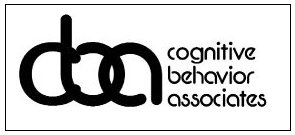Cognitive Behavior Associates specializes in a type of psychotherapy called Cognitive Behavior Therapy (CBT). CBT is a group of treatments based on scientific, empirical data shown to be effective for a broad range of psychological disorders.
Cognitive Behavior Therapy (CBT) is a method of psychotherapy that involves helping people to see how their thoughts and behaviors relate to the way they feel and how this might contribute to their problems. Because each individual is different, each treatment is individualized to the specific patient problem. In each case we make use of various CBT treatments shown in controlled clinical trials to provide long-lasting results. CBT is generally a time-limited psychotherapy, meaning that an individual has appointments over the course of 3-6 months, with follow-up sessions as needed.
Treatment is goal-oriented, where the therapist and the client work together to develop goals and working step-by-step towards achieving those goals. Clients actively participate in treatment both within and between sessions, e.g. clients are given task assignments to complete between sessions. CBT primarily developed through the merging of two therapies: Cognitive Therapy and Behavior Therapy. This integration of Cognitive and Behavioral practices and theories is then applied as one unified treatment.
CBT has three primary components:
Cognitive Therapy
Cognitive Therapy refers to an approach pioneered by a group of therapists in the 1970's, including psychologist Donald Meichenbaum (Cognitive Behavior Modification), Albert Ellis (Rational Emotive Behavior Therapy) and psychiatrist Aaron Beck (Cognitive Therapy). In cognitive therapy, clients learn how to recognize automatic negative thoughts and realize how they effect emotions. Clients learn how to analyze these thoughts in terms of helpfulness and learn to replace them with more productive thoughts.
Dr. Beck discovered that many of his clients' problems were supported by recurring thoughts, usually of a self-critical or pessimistic nature (e.g., "I'm no good." or "I can't handle things"). Because thoughts can influence feelings and behaviors, Dr. Beck realized that isolating negative thoughts and replacing them with more positive thoughts is useful in the client's understanding of his/her disorder. Cognitive therapists not only make clients aware of these thought patterns, but get them to explore new ways of thinking about themselves, their lives, and their actions and see what positive effects this may have.
Behavior Therapy
Behavior Therapy is a type of approach to psychotherapy that focuses on isolating the specific behavior the client wants to change by trying to understand how the problematic behavior developed in the first place. Once the client learns how the unwanted behavior developed, they can then develop specific skills and techniques to control or even eliminate undesired behaviors.While many of the specific techniques used to bring about these changes were developed originally by behavior therapists (e.g. deep muscle relaxation and assertiveness training), we also make use of strategies adapted from hypnotherapy, systems therapy, and traditional psychotherapy. "Exposure" based treatments have also taken an important place in the treatment of a number of anxiety disorders. An example of exposure based treatments is Prolonged Exposure with Cognitive Reprocessing therapy that we use for clients suffering from Post Traumatic Stress Disorder.
Third Wave Treatments
By the beginning of the 1990’s Cognitive and Behavioral approaches had been well documented and had established efficacy. This allowed our researchers to begin to look at modifications and additions to traditional CBT in order to make our treatments even more effective and to allow clinicians to select from these additions other ways of helping clients to achieve their goals. At CBA our clinicians have been trained in these new models (sometimes referred to as the “Third Wave”. In recent years, CBT therapists make use of mindfulness and acceptance based approaches that borrow from eastern psychologies regarding "thoughts" and meditation practices. These new approaches involve teaching clients a completely different relationship to thinking in general. By developing mindfulness techniques, clients are taught that "thinking" is just one of many ways of "knowing". Clients then learn to notice and interrupt negative thoughts on their own and live more fully "in the moment".
These third wave treatments include:
- Mindfulness Based Cognitive Therapy (MBCT) was first empirically supported for patients who have suffered from multiple major depressive episodes during their lifetime. Initial studies showed that it cut the rate of suicide in this patient population by over one-half. MBCT involves teaching the patient a form of meditation referred to in English as “insight meditation” and in Pali as Vipassana meditation. This allows patients to become increasingly aware of their reactive vs. intentional responses. MBCT helps clients to step back from their process and decide how to respond based on their values and goals. Mindfulness is not defined as “mind control” but knowing where your mind is and then acting intentionally.
- Compassion Focused Cognitive Behavior Therapy was first developed in the U.K. by Paul Gilbert and his work has been expanded by Dennis Trich. Here the emphasis is on the relationship the client has with his/her own feelings. Being compassionate to the self has the effect of helping all of our other interventions be more effective. It is a “context” (self compassion) from which we think clients are able to make the difficult decisions and changes more easily. Gilbert was able to see on brain imaging studies how this different context changes neurological functions.
- Acceptance and Commitment Therapy (ACT), developed by Steven Hayes. This model starts with the notion that difficult situations and emotions are a part of life and rigidly controlling them actually leads to more difficulty. Highlights of ACT include values work and Mindfulness Training.

